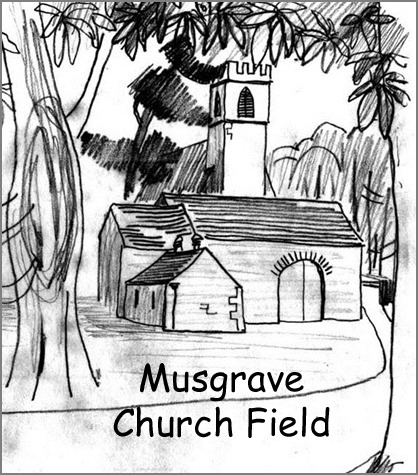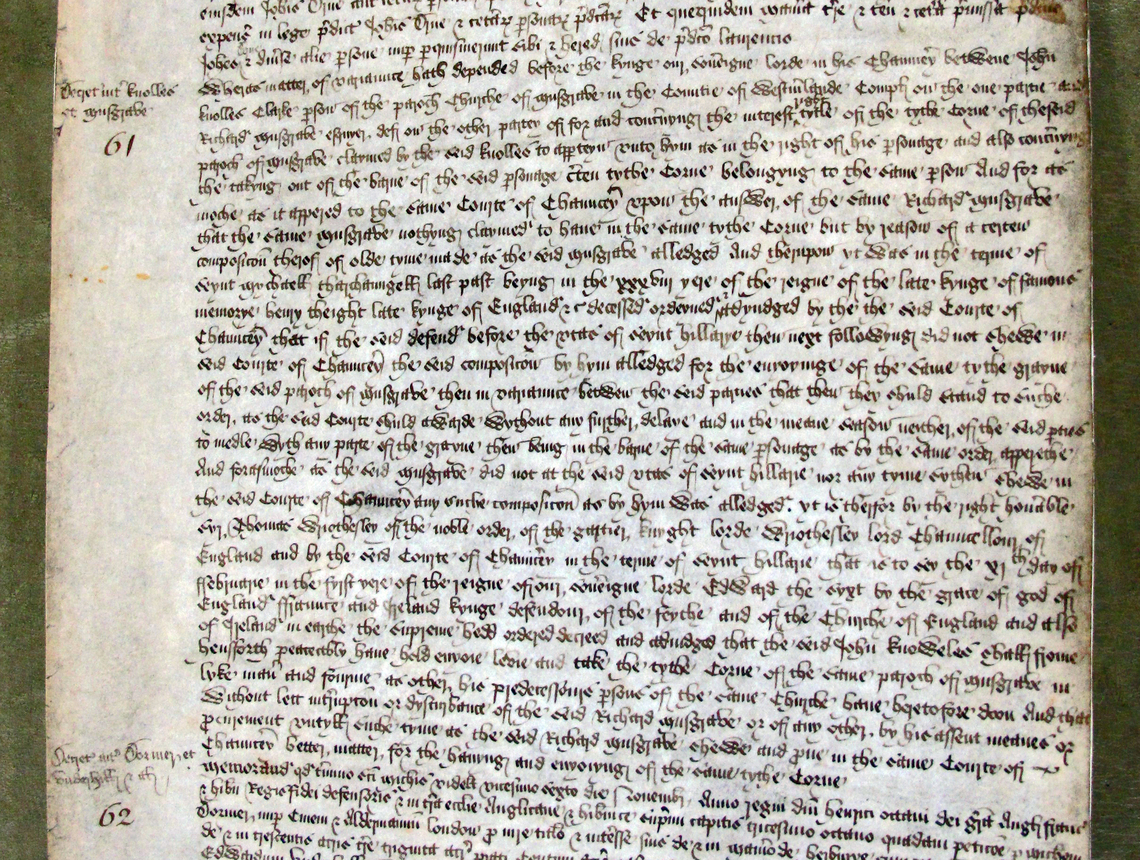In 1546 a dispute arose between the rector John Knolles and Sir Richard Musgrave who was
"taking out of the barne of the seid p[ar]sonage c[er]ten tythe corne".
This story starts with the Valor Eccelesiasticus church survey carried out by Henry VIII in 1535. The Parish of St. Theobald was valued at £16 12s 10½d per annum, including tithes of grain (£10), hay (18s 10½d), lamb and wool (£2 6s 8d) and flax and hemp (3s). Perhaps because of this, Thomas Cromwell appointed Sir John Knolles as rector in 1535 (one of 'Cromwell's chaplains'). But in the Pilgrimage of Grace rebellion in 1536 the parishioners of St.Theobald's refused to pay tithes to vicars who were absentees, laymen or heretics (Aske's Rebellion 1536-7). Instead they "paid them to Sir Will. Musgrave, their master [father of Richard Musgrave]. The bailiffs, Edw. Maltbie and Alex. Musgrave, have taken them in their master's name." (Letters, Henry VIII, 1536, 13 January).
The rebellion was ruthlessly crushed and Thos. Sutton and Ant. Amontson, of Little Musgrave, were condemned to die in Carlise on 24 February 1537. Thomas Cromwell was himself beheaded, without trial, in 1540. This is the background to this dispute and shows how these momentous events affected even remote Musgrave, and the tithe barn!.
The dispute went to the equity Court of Chancery, at a very interesting time, at the end of Henry VIII's reign (see Notes) - perhaps Knolles only then felt able to take his dispute to court. He won - the court decreed on 11 February 1547 that "the seid John Knoweles shall from hencforth peaceable have hold enyoie levie and take the tythe corne". The rebellion was over!
The relevant Decree Rolls can be examined and copied in The National Archives in Kew under the classification C78. Digital copies can also be downloaded from the Anglo-American Legal Tradition at the University of Houston.
The relevant one here is C78/3/61 as Knolles vs Musgrave.
This can be downloaded from C78/3/61 Image 1 and C78/3/61 Image 2
A copy is shown here:
It is written in English and a line-by-line transcript is given below (with help from June Hall):
Line
- Whereas matter of variance hath depended before the kynge our sovreign lorde in his Chancery betwene John
- Knolles Clarke p[ar]son of the paroch churche of Musgrave in the countie of Westmorlande compt(1) on the one partie and
- Richard Musgrave esquir def on the other partey of for and concerning the interest right tytle of the tythe corne of the seid
- paroch of Musgrave claimed by the seid Knolles to appteyn unto hym as in the right of his p[ar]sonage and also concerning
- the taking out of the barne of the said p[ar]sonage c[er]ten tythe corne belonging to the same p[ar]son and for as
- moche as it appered to the same courte of Chancery upon the answer of the same Richard Musgrave
- that the same Musgrave nothyng claimed to have in the same tythe corne but by reason of a certen
- composition thereof of olde tyme made as the seid Musgrave alleged and therupon yt was in the terme of
- seynt Michael thArchangel last part beyng in the xxxviij(2) yere of the reigne of the late kynge of famous
- memorye Henry the ight(3) late kynge of England pc [etc] decessed ordeyned adyudged by the seid court of
- Chancery that if the seid defend[er] before the utas(4) of seynt Hillarye then next followyng did not shewe in
- seid court of Chancery the seid composition by hym alleged for the enyoyinge of the same tythe grayne
- of the seid paroch of Musgrave then in variance between the seid parties that then they shuld stand to suche
- order as the seid court of Chancery shuld awarde without any further delaye and in the meane season neither of the seid p[ar]ties
- to medle wyth any parte of the grayne then being in the barne of the same p[ar]sonage as by the same order apperethe
- and forasmoche as the seid Musgrave did not at the seid utas of seynt Hillarie nor any tyme sythen shewe in
- the seid court of Chancery any suche composition as by hym was alleged. it is therefor by the right hon[our]able
- Sir Thomas Wriothesley(5) of the noble order of the garter Lorde Wriothesley Lord Chancellor of
- England and by the seid court of Chancery in the terme of syent Hillarie that is to sey the xith day of
- februarie in the first yere(6) of the reigne of our sovereign Lord Edward the syxt by the grace of god of
- England frannce and Ireland kynge defender of the feythe and of the Church of England and all
- of Ireland on earth the supreme hedd ordered decreed and adjudged that the seid John Knoweles shall from
- hencforth peaceable have hold enyoie levie and take the tythe corne of the same paroch of Musgrave in
- lyke man[ner] and fourme as others, his predecessors p[ar]sons of the same church have heretofore done and that
- without lett int[er]ruption or disturbance of the seid Richard Musgrave or of any other, by his assent means or
- p[ro]curement until suche tyme as the seid Richard Musgrave shewe and p[ro]ve in the same court of
- Chancery better matter for the havyng and enjoiyng of the same tythe corne
Notes
(1) Compt: Count or Sir
(2) 1536
(3) Henry VIII died on 28 January 1547 (in the 38th year of his reign), succeeded by Edward VI
(4) ‘Utas’ means the ‘octave’ of a festival, or the eight days after the feast day. Presumably the court could then sit on the same day of the week, even as the feast day itself changed.
(5) Sir Thomas Wriothesley, created Earl of Southampton on 16 February 1547, replaced as Lord Chancellor by Sir Richard Rich on 5 March 1547
(6) 1547

